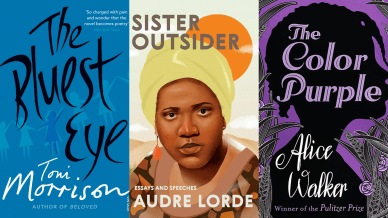4 books that testify the legacy of Black feminism
From Toni Morrison to Alice Walker, here are four books that explore the experience of African-American women.

During a class, the professor emphasized on reading essential literature that speaks for more than just the aristocratic society. Initially I had no intention of picking up the book and reading voices that had no significant impact to our reading, from the Indian temperament. But as I entered the last semester of my college, I not only found joy in reading diversity in voices, rather I found a sense of comfort and belonging, a space in the voice of a woman, who felt like a blood relation.
As I turned the pages of Beloved, a novel with no definitive chapters, it took me a while to realise the weight of a pain carried by a protagonist who has nothing but endured and a silence that casts away with the final word, ‘Beloved.’
monthly limit of free stories.
with an Express account.
There was much to be learnt and much to be discovered and after the very final reading of Morrison’s famous novel, I bowed down to a collection of short stories by African American writers. It moved me. Since then, it has been an unravelling journey of finding a belonging in Black Feminism.
From the expeditions of delving deep into the voices arising on the surface level, these are 4 books that transcend the borders of femininity. They speak of a quiet resilience burning up and leaving a footprint of unapologetic experiences and answers to questions as to why Black Feminism remains relevant even today.
The Bluest Eye by Toni Morrison
The 1993 Nobel Prize winner in literature sought to understand the complexities of beauty standards in The Bluest Eye. In the introduction of her novel, which also happens to be her very first novel, Morrison, inspired by a personal anecdote, accounts on the effort to emphasise on why African-American women have been conditioned to think of beauty to look a certain way. Why they prayed to look more desirable in front of a society that had discarded all their expectations, the force that reckoned a probability that they were not made aware of. The book explores the voice of Morrison that raises questions on why the African-American woman is not made to feel enough.
If you are someone who likes immersing in the ten pages that answer the simple question of ‘why’ concerning identity speculations and realness in the voice of the author, this book is made for you.
Black Looks by Bell Hooks
A literary genius who understands a woman who did her homework, Bell Hooks puts her personality in retrospection, analysing the key problem that led her to write a collection of critical essays that speak to the audience that understands language too well. She makes a point in relevance as to why the African-American community have never truly found a way to theorize their experiences. She writes in her introduction to the novel as to why her community has believed their experiences to be insignificant and the possibility to understand that insignificant experiences don’t make space for the part where they subconsciously believe things to be normal instead of as an infliction.
Sister Outsider by Audre Lord
A poet and an icon, her work has crafted the words with precision, that step up as poetry that pulls a trigger in the heart of a life waiting to find light at the end of the tunnel. A collection of her work, spanning for over a decade, Lorde writes the pages of this book as a testament to her own life. Unwavering efforts to get back to her roots, first as an African-American woman, then as a woman who has fought cancer, a lesbian and a mother of two children, Lorde’s perfection oozes out in the most honest tone taking abstracts from her personal life, how it shaped her wholeness and how acceptance of the parts of a life, stand tall and unwavered towards the legacy she created.
The Color Purple by Alice Walker
A healing message to the world of reciprocity, The Color Purple is Walker’s account to a life that is more than just about two estranged sisters, it is about the mutual love and connection find in the hearts of life that connect between two women. The novel also focuses on the distorting idea of a man’s protection and how the delusion can trap the ambitions of African-American Women who have sight and ambition. Another important part that has been touched upon is the sexuality in women that still remains a taboo. The scenes are explicit yet tender, revealing the side of African-American women that is for once, not tortured or turbulent, rather is a raw, explicit revelation of the female desire.